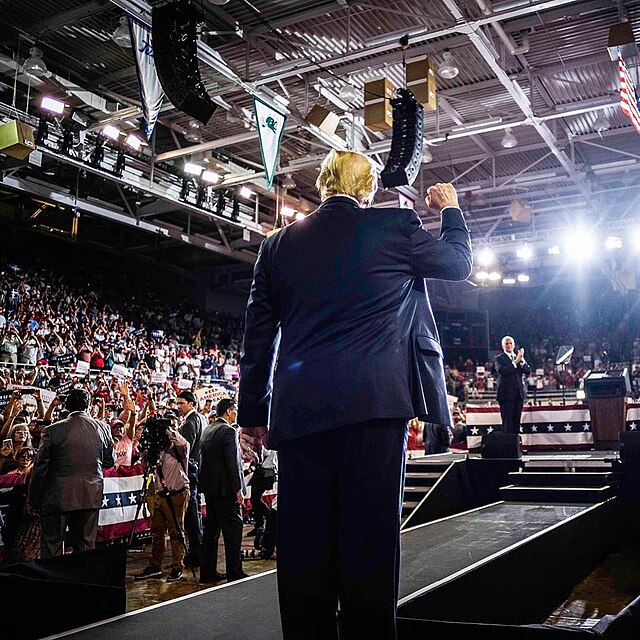In the first 100 days of his second presidency, President Donald Trump quickly set the tone for his administration’s priorities. From language policies to border security, economic measures and education reforms, his early actions reflect his push to advance his agenda.
Just 40 days into office, on March 1, President Trump signed an executive order declaring English the official language of the United States. The move overturned a 2000 directive by President Bill Clinton that had required federal agencies to offer language support to non-English speakers.
In a press release, Congressman Robert Aderholt would help unify the country by reinforcing a shared national identity.
Alumni Diana Casillas, whose family has been impacted by immigration policy, questioned the necessity of Trump’s English-only executive order.
“I feel like it’s just counterintuitive,” she said. “Considering America is such a big melting pot of different cultures and diversity, making English the official language doesn’t really change anything.”
Casillas also criticized Trump’s approach to border enforcement and immigration policy.
“First of all, he’s causing such emotional distress to so many people,” she said. “Aside from the criminals, what about those who contribute to this economy?”
Fellow alumna Anna Khondkaryan, an immigrant herself also voiced frustration over recent deportations.
“I am very against the deportations that are happening at the moment,” she said. “They’re deporting ‘the worst criminals’, yet it’s American citizens who commit the most crimes.”
The administration has argued that strong border enforcement is essential to national security and has issued multiple executive orders to support his position.
The economy has also been a priority for the Trump administration in its first month, with the President signing multiple executive orders aimed at reducing government regulations on businesses.
Casillas expressed concern that deregulation could come at the cost of environmental protections.
“He already removed us from the Paris Agreement a second time,” she said. “I care deeply for the environment. Is he willing to put the country at environmental risk for more profit?”
The administration has said it aims to balance economic growth and environmental responsibility by cutting restrictions on energy and manufacturing industries.
Khondkaryan said she wasn’t surprised by Trump’s stance.
“Trump’s policy has always been anti-environmental as far as I am concerned,” she said. “The reason he did that was to let the businesses pay less taxes because his policy is pro less taxes for the business owners.”
In an article published by the United States Environmental Protection Agency, the Trump administration’s ‘Unleashing American Energy’ executive order seeks to expedite federal permitting processes for energy projects considered vital to the nation’s economy or national security.
President Trump has also sought to limit federal funding for school programs that do not align with his administration’s values. For instance, he has opposed funding for programs that promote racial or gender-based initiatives, arguing that they are divisive or politically biased.
According to an Associated Press article, the Trump administration directed schools and universities to eliminate diversity, equity and inclusion (DEI) initiatives. The administration justified this move by citing the 2023 Supreme Court decision that prohibited the use of race as a factor in college admissions.
In an article from McGuireWoods LLP, the Department of Education emphasized that educational institutions should not treat students differently in any capacity based on race.
“Put simply, educational institutions may neither separate or segregate students based on race, nor distribute benefits or burdens based on race,” the department stated.
The administration says the shift is intended to improve academic achievement over identity-based programs.
“You cannot erase diversity or equality because you’d be erasing the voices of so many different individuals,” Casillas said.
An executive order was signed to return control over education to states and local communities. Secretary of Education Linda McMahon stated that this move empowers local entities to make decisions best suited for their educational needs.
According to the U.S Department of Education, McMahon released the following statement following President Trump’s Executive Order to return education to the states:
“Today’s Executive Order is a history-making action by President Trump to free future generations of American students and forge opportunities for their success,” she said. “We are sending education back to the states where it so rightly belongs.”
In early April, President Trump declared a national emergency to address the persistent U.S. trade deficit. Utilizing the International Emergency Economic Powers Act (IEEPA), he announced a 10% tariff on all imports, effective April 5.
Additionally, higher tariffs were imposed on countries with which the U.S. has significant trade deficits, which began on April 2.
According to the White House website, his order imposes responsive tariffs to strengthen the international economic position of the United States and protect American workers. As a young adult in college, Casillas stated how tariffs impact her.
“Many of our materials come from different countries,” she said. “As someone who’s trying to create a life for themselves, I’m scared of the rising costs of goods.”
China was most impacted by this tariff increase, experiencing 145% tariffs. However, on May 12, these tariffs were paused for 90-days and reverted back to 30%.
A dispute over the deportation of immigrant Kilmar Ábrego Garcia to a prison in El Salvador, despite a court order delaying his removal, sparked public backlash. The Supreme Court has since ordered his return, citing procedural violations.
Khondkaryan said recent policy shifts have made her question her future security.
“It feels like everything is in danger,” she said. “From what we pay for everyday goods to the way the government handles people’s rights. It’s a lot to take in as someone just trying to build a future.”
This article originally appeared in the Summer 2025 print edition.




